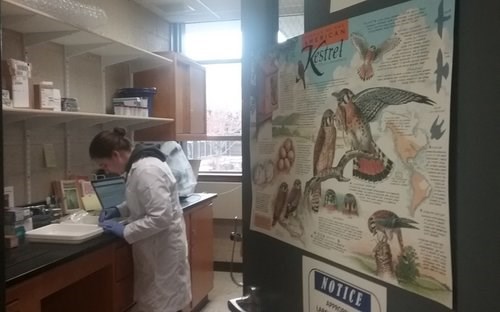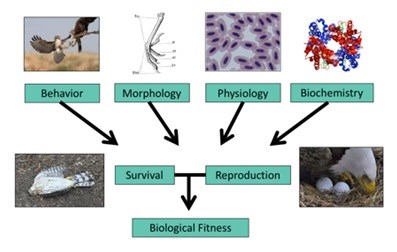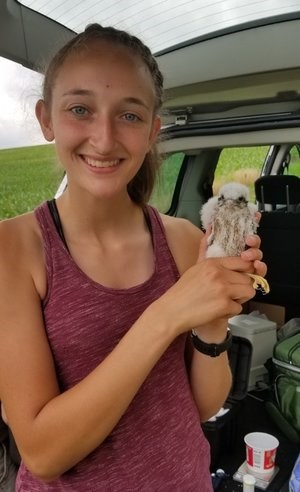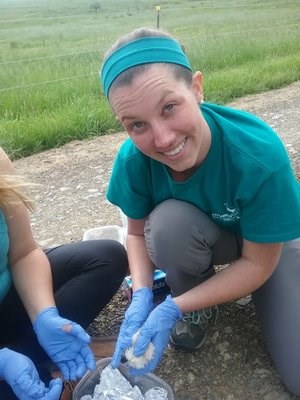Partnership of Promise
Posted on in In the Field by Zoey Greenberg, Science Outreach CoordinatorZoey Greenberg, Science Outreach Coordinator

“Physiology: a branch of biology that deals with the functions and activities of life or of living matter (such as organs, tissues, or cells) and of the physical and chemical phenomena involved."
— Merriam-Webster
On October 23, assistant professor Allison Cornell visited Hawk Mountain from Cedar Crest College to provide a seminar on the physiology of developing American kestrels, emphasizing the role of the Sanctuary’s nest box program in her research.
Collaboration between Dr. Cornell and Dr. JF Therrien, senior biologist at Hawk Mountain, began in 2017 and has resulted in exciting science concerning a widely-appreciated falcon species that has been experiencing declines nation-wide.
In her seminar, Dr.Cornell highlighted the importance of an integrative approach to understanding the ecological context of a species, stating a cherished quote of hers:
"Behavior is observed physiology."
— Vincent Dethier.

As a physiologist, Dr. Cornell’s methods include the assessment of internal as well as external factors that could influence the survival and overall condition of developing birds. Her past work has included assessing the relationships between nestling condition and oxygen storage capacity and identifying how factors such as timing of breeding are related to developmental cues in starling chicks. This type of research adds color to the bigger ecological picture, allowing us to learn more about why birds exhibit the behaviors they do, and how this relates to their overall survival. Factors like pectoral muscle mass, aerobic capacity, red blood cell count, and wing area are just a few telling descriptors that can shed light on what prepares a bird to leave the nest. Turns out, there’s more to it then being kicked out by your parents!
For Dr. Cornell, Hawk Mountain’s kestrel nest box program has been instrumental to the success of her research. Nest boxes provide an opportunity to observe kestrel development in a natural setting rather than in a lab where results can be compromised by the lack of true environmental influences. In addition, the nest box program has done the ground work of establishing relationships with landowners, which allows for Dr. Cornell’s research to be conducted in a kestrel-friendly culture.

Hawk Mountain sees immense value in partnering with an experienced researcher who has the time and passion for conducting good-quality science using Hawk Mountain’s long term data set and putting in the field time to monitor boxes. In addition, trainees and students from both sites are benefiting from the academic opportunities included in this project. Mercy Melo, a student at Cedar Crest, and Jen Houtz, a former conservation science trainee, are both currently involved in the work with Dr. Cornell.
Through the deployment of nest cams and this thorough approach to ecology, Dr. Cornell has given students access to several thought-provoking research topics, including how physiology traits change across nesting period and whether “dead beat” falcon dads have an impact on the physiology of their young. This work has the potential to fill information gaps and provide necessary context to the kestrel decline.

Collaboration between Hawk Mountain Sanctuary and Cedar Crest College has opened doors to new research, and has also given young professionals the chance to step into raptor ecology with resources that are not always easy to come by: a long term data set, accessible observation sites, and supportive advisors from neighboring institutions. This is a clear win-win for raptor conservation and one that Hawk Mountain is thrilled to be a part of.

Click here for more information on our kestrel nest box program, or see below for Allison Cornell’s.
Variation in developmental trajectories of physiological and somatic traits in a common songbird approaching fledging. Journal of Experimental Biology. Cornell A, Williams TD. 2017-10-13
Experimentally-increased male social behaviour has no effect on female breeding phenology and performance. Animal Behaviour. Cornell A, Hou JJ, Williams TD. 2017-01-23
Double-brooding and individual quality in a highly synchronous songbird population. The Auk. Cornell A, Williams T. 2016-01-13
Physiological maturity at a critical life-history transition and post-fledging flight ability. Functional Ecology. Cornell A, Gibson KF, Williams TD. 2016-10-04
Mid-winter temperatures, not spring temperatures predict breeding phenology in the European starling Sturnus vulgaris. Royal Society Open Science. Williams TD, Bourgeon S, Cornell A, Ferguson L, Fowler M, Fronstin RB, Love OP